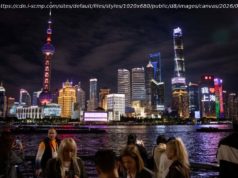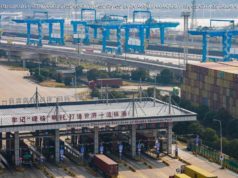Despite a successful first 12 months, the theme park’s fortunes could be facing a roller coaster ride as a raft of local rivals set their sights on a slice of the action
Shanghai Disneyland celebrates its first birthday on Friday. The US$5.5 billion theme park opened with a fanfare on June 16,2016, and despite niggling complaints about costly food, long queues, ticket scalpers and rude tourists, it has since welcomed more than 10 million visitors. Despite the auspicious start, it might not yet be time to celebrate, as the 3.9 sq km attraction in the heart of the Chinese metropolis is set to face some stiff competition. First up is the 3-billion-yuan (US$440 million) Shanghai Polar Ocean World, which is scheduled to open in July next year. Located about a 30-minute drive from Disneyland, it is forecast to draw about six million visitors a year. A further half-hour’s drive away will be Ice World, which is set to open around 2019 and which is being touted as the world’s largest indoor ski park. And in 2022, the city will become home to China’s first Legoland. Polar Ocean World will be operated by China’s Haichang Group, Ice World is a joint venture between the Shanghai government and Singapore property developer KOP Group, and Legoland is owned by Britain’s Merlin Entertainments Group. But the competition is not restricted to Shanghai. Investors and developers are flocking to eastern China in a bid to tap into its wealth of leisure and entertainment consumers. In neighbouring Jiangsu province South Korea’s Lotte Group has begun the development of an indoor attraction, while in Zhejiang province, US-based Six Flags Group has begun work on an outdoor park. Full details of the attractions’ themes have yet to be made public. Meanwhile, Chinese property and entertainment giant Wanda Group has promised to “rival Disneyland in the Yangtze River Delta” in terms of scale and technology with a 21 billion yuan theme park that’s scheduled to open next year in the Jiangsu city of Wuxi, about 130km or two hours’ drive from Shanghai. “These new projects will drag some visitors away from Disneyland, that’s for sure, ” said Professor Yao Kunyi, a tourism specialist from the Shanghai University of International Business and Economics. “The Yangtze River Delta is rich and will never lack customers. It boils down to whether each theme park can provide distinctive enough products and services (to draw these customers) . Chinese tourists are getting pickier. They’ ve come to prefer new things and will discard the old.” The Yangtze River Delta is one of China’s wealthiest regions, and it’s getting steadily richer, according to Timothy Chen, research director for the east China branch of Canada-based property services firm Colliers International. Home to about 330 million people, its economic indicators for both personal disposable income and consumption of tourism, culture and entertainment against income have also been on the rise, making it fertile ground for theme parks, he said. “Based on international experience, when a region’s gross domestic product per capita surpasses US$5,000, there will be a mature tourism and holiday economy, ” Chen said.
Shanghai’s GDP per capita last year was almost 114,000 yuan (US$16,750) , while in Jiangsu and Zhejiang, the figures were 95,000 yuan and 84,000 yuan, respectively. “These figures are far higher than the US$5,000 benchmark, meaning that the delta region has a huge demand for leisure and tourism, ” he said. According to the National Bureau of Statistics, Shanghai last year topped the national charts for residents’ average disposable income with 54,305 yuan. It was followed by Beijing (52,530 yuan) , Zhejiang (38,529 yuan) , Tianjin (34,074 yuan) and Jiangsu (32,070 yuan) . Shanghainese spent 16.2 per cent of their disposable income on education, culture and entertainment in 2014, according to the latest figures available on the municipal statistics authority’s website. The desire to emulate other developers’ success has also contributed to the abundance of theme parks sprouting up in the region, said Wei Xiang, from the Chinese Academy of Social Sciences’ National Academy of Economic Strategy. “ (Many Chinese theme parks) just copy successful foreign parks, ” he said. But unlike those projects, domestic developers “don’ t conduct research on visitors’ characters and behaviour, ” he said. Also, many Chinese property developers and investors look for high returns in the short term, though the very nature of theme park projects is that the yields are lower and longer term, Wei said. Of the more than 2,000 theme parks currently in operation across China, just 10 per cent are making steady profits, according to a Sina.com report quoting property consultancy firm Cushman & Wakefield. One in five is breaking even and a massive 70 per cent are either making a loss or have yet to turn a profit, it said. According to figures from Colliers International, the country’s top 10 domestic theme parks drew an average of 4.5 million visitors in 2015. Of those, Chimelong Ocean Kingdom in Zhuhai, Guangdong province, was the most popular, with almost 7.5 million visitors. “Tourists’ time and budgets are limited, so competition (among theme parks) is inevitable, ” said Colliers International’s Chen. “It will be a test for the parks’ operators.” Despite the growing competition, it’s not all doom and gloom for Shanghai Disney, Wei said. “The strong performance of Shanghai Disneyland indicates that the market is not yet saturated and there is still a lot of growth potential, ” he said. “Disney came to China bringing its 150 years of experience and expertise. Compared with its mainland rivals, it has apparent strength – at least for the short term.” Neither is the growing number of theme parks necessarily a bad thing for Disney, as while it means more competition, it also fosters synergy and helps to project the image of Shanghai as a global tourism hub, Chen said. “Tourists will regard visiting each of the theme parks as an important part of their travel plans, just as people do when they travel to Los Angeles, San Diego or Orlando, ” he said. Despite the newcomers nipping at its heels, Disney is unfazed. “Competition has been a reality in this business since Walt first invented it with Disneyland and we believe the Disney brand – delivering high-quality family entertainment – sets us apart from our competitors, both in China and around the world, ” said a Shanghai Disney Resort spokesman. The resort, which is a joint venture between Walt Disney and the Shanghai government, was the sixth Disney park to open worldwide and the first in mainland China. When it opened last year, it was seen as a clear rival to its Hong Kong counterpart, which opened a decade earlier, and the figures support the expectations.






